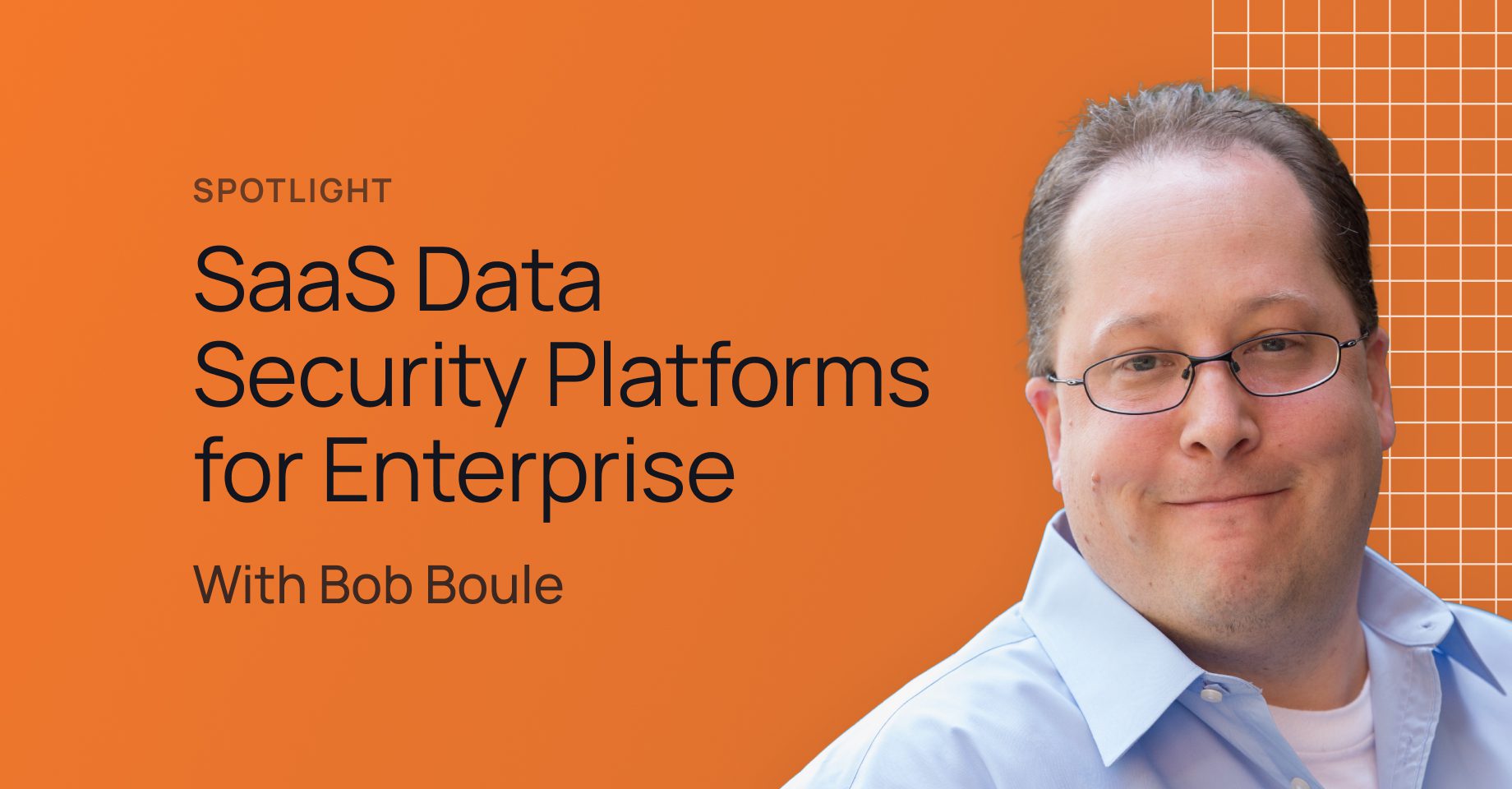As more organizations continue to shift their data to the cloud, teams are often confronted with an important question: Why should I use Software as a Service (SaaS)?
Our short answer? Why not SaaS!? Offering reduced time to benefit, lower costs, enhanced scalability, smoother integrations, and regular updates and upgrades, SaaS provides the agility necessary to fully leverage evolving cloud data resources.
In this month’s Immuta Spotlight, we’re talking to Bob Boule, our senior product manager, about enterprise-class SaaS for Data Security Platforms and how his team is makes SaaS fast.
+ + +
Bob Boule is the Senior Product Manager responsible for the Immuta SaaS offering. Bob has 15-plus years of product management experience with a particular focus in the last five years on running SaaS offerings. Prior to Immuta, Bob led teams that launched successful SaaS offerings for companies like Black Duck Software (acquired by Synopsis), TimeScale (an open-source Time Series Database Offering), and most recently opsMX, where he launched a SaaS offering based on Spinnaker, an Open Source Continuous Delivery Platform.
+ + +
Paul Molinari:
I’m excited to talk with you, Bob. You bring a unique perspective to what a SaaS-based DSP (Data Security Platform) can do for an enterprise.
Bob Boule:
When we think about how we help organizations leverage data, it’s about how to help them do it quickly. They don’t want to spend days, weeks, or months figuring out how to do it. But they have to temper the need to use that data with ironclad security. They have to make sure that folks that aren’t entitled to see sensitive data are not able to if it’s not part of their job. So, when I think about building data security on a SaaS platform, I think about how Snowflake, Databricks, and other cloud data warehouse providers have successfully impacted the market with SaaS platform solutions.
P.M.:
You allude to a platform as something that you build upon, so platforms offer different modules or parts. In our case, there’s this ability to discover, to secure, and to monitor your data. Can you talk about how an enterprise-class SaaS solution provides that modular flexibility and agility for a data team?
B.B.:
The name of the game is speed to implementation. If a customer has a problem – and problems are not like fine wines, they don’t get better with age – they want to be able to fix it quickly. Speed is an inherent ability in SaaS because it’s meant to be a turnkey operation. Companies leverage our software to solve a specific problem. The key is that they need to get to value fast and they don’t want to wait for the IT department to find the time and energy to stand something up. SaaS is fast.
As we look at how we break down customers’ problems, it gets even faster. Rather than trying to implement a complete stack, they can try our data monitoring capabilities in their environment. With that focused approach, they start to get a sense for the problems they need to solve. That helps them figure out what data policies they need to apply, and then start to use our platform to secure data by building and enforcing those policies. This breaks their problem down into subparts. And at Immuta, we break our solution down into those same parts – Discover, Secure, and Monitor – so data teams can solve these problems independently with speed. It’s all about getting to a place where they see a problem, and have the tools to solve that problem.
P.M.:
Another aspect of SaaS’ flexibility and agility is its portability. The product is scalable – you write your data policies once and they propagate across all your cloud platforms. Could you talk about how that portability translates into being more scalable?
B.B:
Well, we need to talk about the way our DSP is architected. When we think about our customers and some of the challenges that we can help them solve, very rarely do customers have one data cloud. Often they may be a Snowflake shop, but then they acquire a company that’s a Databricks shop or vice versa. Or they just acquired a company that’s a Google BigQuery shop, and so on. So, part of being a scalable data security platform is making sure that we can address all of the data challenges that a customer has, regardless of what cloud they’re using. The principles behind the Immuta product design allow you to generate a policy once and apply it to multiple places, and SaaS allows you to do that even faster.
This could be useful whether you’re vertical in Snowflake or horizontal across multiple data sources. Then again, you may add SaaS to that mix because you’re geographically dispersed, which fits the profile of many of our enterprise customers. They likely have a team in the US and a team in Europe – and the rules around data transfers are very, very different around the world. Rather than double the work, I can snap my fingers and roll out another instance for that customer to help solve the regional problems that are relevant to them. And so, if you think about horizontal scalability, it’s really about different regions of the world, data sources that customers have, and the ability to write policy once and apply it across multiple places.
“Being a scalable data security platform is making sure that we can address all of the data challenges that a customer has, regardless of what cloud they’re using. The principles behind the Immuta product design allow you to generate a policy once and apply it to multiple places, and SaaS allows you to do that even faster.”
P.M.:
This sounds like you’re describing a ‘digital suitcase’ in a way. You write your policies, pack them into the suitcase, and unpack them as needed in other cloud provider platforms or geographies.
B.B.:
That’s right. When we think about scale, we don’t want customers’ developers or data stewards doing the same work over and over again. If they can create a policy that can be applied across all their data sources, they’ll want a tool that’s going to enable them to do that. And that’s how Immuta really differentiates itself. When you spin in the SaaS element to this, there’s no heavy lifting to get there.
P.M.:
Let’s talk about SaaS and its lower overhead cost. All the costs of running a SaaS solution are essentially incurred by the host – in this case, by Immuta. Can you talk about some of the cost savings that a SaaS solution may have versus an on-prem or different type of data security solution?
B.B.:
Absolutely. One of the core principles around SaaS for any customer is the need to reach value quickly in that first year. They need ROI out of that purchase. SaaS eliminates all of the overhead that’s associated with setting up, securing, and implementing best practices. They don’t need to wonder ‘is our Kubernetes cluster up to date?’. SaaS takes all that off the table and ensures that the implementation is safe and secure – and cost effective.
Our expertise in locking implementation down safely and securely is first-class. We make sure that you’re solely focused on securing and leveraging the data that is being collected to build a better business. And the SaaS solution is uniquely set up to deliver that value very quickly, so the customer gets the most out of every nickel that they’ve spent because they get to take full advantage of all the features and functionality that we’re delivering.
P.M.:
Fivetran recently published a study through an independent research firm indicating that 71% of respondent’s AI projects were held up because their data scientists couldn’t get access to the data that they needed to do their jobs. When we consider the original promise of the cloud, which was to deliver more efficient data-driven innovation to make better products and services, is a DSP the critical link that fulfills that promise?
B.B.:
I think the dirty little secret here is the cloud has created a scale problem for a lot of customers. I consistently see customers say, ‘hey, I unlocked a scalability problem by moving to the cloud, only to create another one when it comes to consumption’. So now, how do they govern the consumption of all this data?
That’s where Immuta allows companies to very quickly and easily put guardrails up to unlock those data projects. That way, they have a treasure trove of data that they’re able to use without worrying about compliance and security. It’s much easier to do things like sorting an AI project or a machine learning project to train algorithms with more data. The question is just how do you do it safely? That’s really where I think the cloud solved one scale problem and Immuta’s DSP solves the scale consumption issue.
P.M.:
The ‘consumption issue’ – that’s a great way to think about it. If you scale data to the moon without a proper way to consume it safely, you can be in quite a pickle with compliance.
B.B.:
Features that we’ve put together, like sensitive data discovery, help customers automatically identify where sensitive data that might be subject to data regulations is located. As we start to compartmentalize problems like that for customers and offer tools to fix them – like, ‘here’s a hammer that’s going to help you discover sensitive data, here’s a saw that’s going to help you monitor data activities, and here’s another tool that’s going to help you securely enforce data policies’ – now suddenly those consumption problems are less daunting.
P.M.:
Regarding a DSP’s three components – data discovery, data security, and data monitoring – how deep do you need to go in each of those categories to feel good about the DSP you implement?
B.B.:
I think we’ve done a great job of building the top layer to all that in a single offering and because software is always evolving, we’re going to go even deeper. Our strategy and the fact that our leadership team is saying, ‘hey, let’s make sure we have the ability to be the complete data security platform by making sure we’re going deep in each one of these pillars’ is really exciting. But I think that when we start to bring that deeper evolution to the market, you’ll start to see data security requirements evolve within companies, too. You’re going to have customers that are already using us for surface-level capabilities that begin relying more on our solutions as their needs evolve. And again, tying this back to SaaS, we’re just busy working to make sure our DSP is easy, effective, and turnkey. We want our customers to sign up and start solving problems immediately.
+ + +
Paul Molinari is Immuta’s Director of Brand Marketing Strategy.
SaaS is Fast
Find out more about Immuta’s SaaS deployment and see how it works for yourself when you schedule a demo with our team.
Request A Demo


